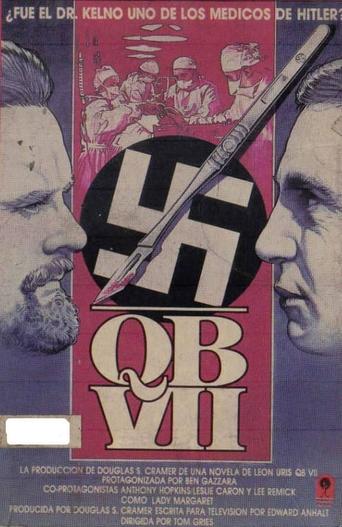

Ground rules first. This masterpiece (won a half dozen Emmys) is not merely a lost miniseries from the 70s, but rather it is the first miniseries of its kind, the template from which all later efforts came. And what an effort it was! Adapted from an international bestseller about a non-Jewish physician who ends up getting special treatment in a concentration camp by "assisting" with medical procedures. When the camp is liberated, said doctor becomes prominent in England, and he (and his family) enjoy the benefits and respect that brings. Until his reputation -- what he may or may not have actually done in that camp -- is challenged in England by an upstart American who is convinced that atrocities were committed. OMG what a cast. Here we have, in a performance of astonishing depth, Anthony Hopkins long before he became knighted, long before Hannibal. And Ben Gazarra giving the performance of his life in counterpoint to the doctor that Hopkins was portraying, as the American upstart. The story engages from the start and just gets better. And better. And better. Today it seems clichéd to have the finale take place in a courtroom but as I said this was the FIRST miniseries, and such criticisms have no substance. I recently saw this beginning to end for the first time in over 30 years, and was again stunned by the quality and the nuances. Like many of the productions that I focus on here on IMDb, it is a one of kind, something so special that to compare it is to misunderstand it. See it.
... View MoreOne of the earliest of TV mini-series casts Anthony Hopkins and Ben Gazzara who are the plaintiff and defendant in a libel suit. The case is being settled in the courtroom number seven of the Queen's Bench in London, QB VII. What Gazzara is accusing Hopkins of is monstrous indeed, the participation of experiments on Jews in the concentration camp of forced sterilization which involved chemical and physical castration. Not an easy thing to prove because since World War II, Hopkins, an anti-Communist Polish refugee has been knighted by the Queen for his humanitarian work among the Arab desert tribes. That's probably no accident he chose to settle there with his wife Leslie Caron and son who grows up to be Anthony Andrews. The shifting sands of the Cold War has made such charges tinged with political overtones.Gazzara is author Leon Uris inserted into the novel and Uris himself doesn't paint a flattering portrait. He's one of Jewish heritage who is not terribly religious. Gazzara married a British girl, Juliet Mills, who was a nurse seeing to his recovery and they have a son who grows up to be Kristoffer Tabori. Gazzara becomes a hack Hollywood screenwriter and gets rich and bored. But he then writes an epic Jewish novel the way Leon Uris wrote Exodus of deeply researched historical fiction and he names Hopkins and what he allegedly did.This is by no means a strange phenomenon. From the Fifties through the Nineties we heard stories of former Nazis turning up in all kinds of places and in plain sight, not hiding in the deep recesses of Argentina or Paraguay which seemed to be favored by Nazis of higher rank and profile like Dr. Mengele. The President of Austria in the Eighties, Kurt Waldheim had his Nazi past uncomfortably exposed once he was in office. And Ivan Demjanjuk at the ripe old age of 95 after years as an automobile worker in the USA just got sentenced for his war crimes. I doubt we'll be seeing too many more though.QB VII got a flock of Emmy Awards and nominations including in the Supporting Acting category for Juliet Mills and Anthony Quayle who plays the barrister representing Gazzara. His cross examination scene with Hopkins is devastating. And of course Gazzara and Hopkins are at their usual sterling best.QB VII marked the farewell performance of Jack Hawkins who had for several years performed without a voice box due to throat cancer which finally claimed him. In QB VII a voice similar to his was used which was not always the case. In a sense this film is his because Hawkins plays the judge presiding over the court in QB VII.This mini-series holds up very well today and I recommend it highly for viewers who are interested in Holocaust justice and the unfortunate politics that sometimes accompanies it.
... View MoreThis was a fascinating mini-series based on the Leon Uris novel of the same name, and it helped to launch the mini-series genre. It is VERY fortunate that the producers were able to get such gifted stars as Ben Gazzara and Anthony Hopkins for the leads. Writing, acting, music and exotic locales make this a must-see.The plot is based on a real-life lawsuit against Uris following the publication of his novel EXODUS. Dr. Adam Kelno is a very well-respected medical doctor who was knighted for his humanitarian work. However, the writer Abe Cady writes a novel that names Kelno, among others, as having committed was crimes while working for the Nazis many years earlier. The central questions of the series are DID Kelno work for the Nazis and IF he did, was he the benevolent man he claims to have been or a monster who was NOT forced to commit atrocities.
... View MoreMy first discovery of astonishing acting by Anthony Hopkins, still memorable after 25+ years. Riveting plot with twists and turns and dogged detective work by the Ben Gazzara character. Not sure where you can find it these days, but if you run across it, you won't be disappointed.
... View More